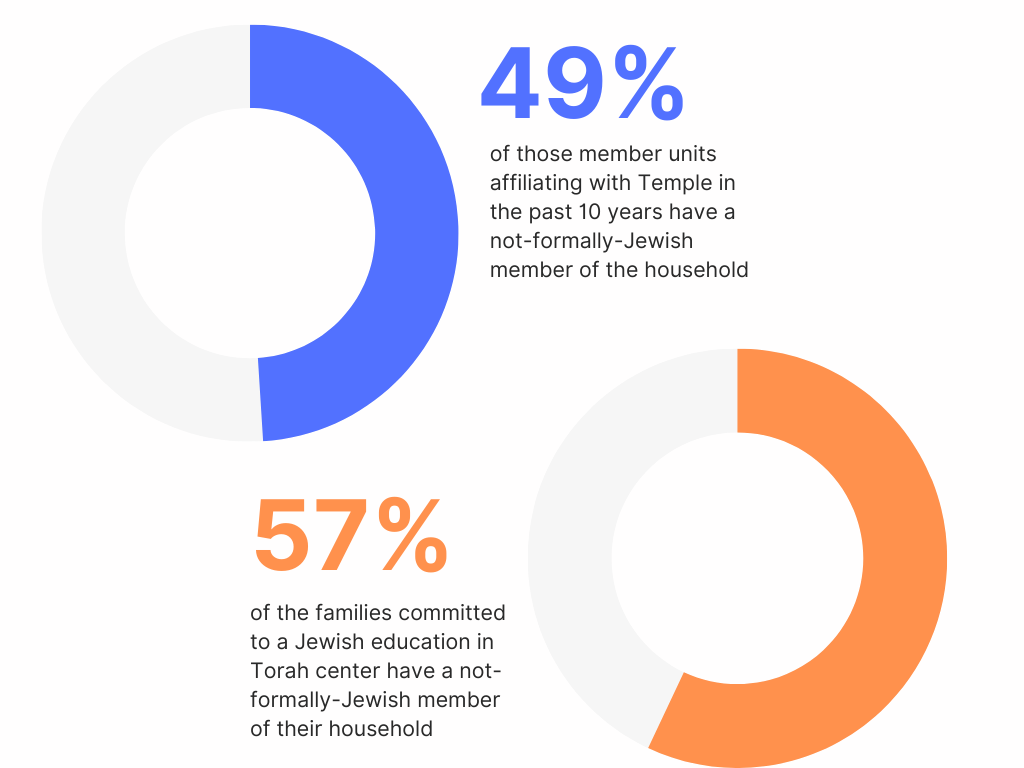A More Inclusive Board
Temple Emanuel is home to a community representing the diversity of American Jewish life with respect to interfaith family status, race, gender identity, sexuality, ideological diversity, and more. The diversity of our community is our strength: our study of Torah, rich programming, educational experiences, and community vibrancy is enriched by the wisdom gleaned through different life experiences; our familial connections to our interfaith partners form bonds reflecting our shared values; and our ability to welcome new individuals and families is predicated upon being a welcoming environment where everyone can see themselves reflected in our community. Everyone who shares our commitment to Temple’s Vision & Mission is welcome here.
Serving in positions of leadership has historically been less inclusive. Temple’s current bylaws state: “membership on the Board of Trustees is reserved for Jewish Members.” Reflecting perhaps a time when one who wasn’t Jewish would have no interest in serving on the Board or when Temple’s demographic makeup was different, this restriction appears to make intuitive sense. Why would someone who wasn’t Jewish want to help lead Temple, or why would Temple need the skills and experience of someone who isn’t Jewish? Upon further reflection, this is far less intuitive than it may seem.

There are many who call Temple their religious home, or their family’s religious home, who do not meet halachic definitions of being Jewish. Some are actively practicing another faith tradition but align with the values of Reform Judaism and Temple Emanuel. Others are involved in exclusively Jewish households but have opted not to formally convert for familial or personal reasons. Regardless of the circumstances, we know that there are many in our community who are committed to Temple’s Vision & Mission, who volunteer their time and commit their dollars to sustaining Temple, but who are excluded by this policy. Their personal and professional skills, their life experiences reflective of a growing number of our participants, and their commitment to Temple are so important to us that Temple’s Board of Trustees recommends changing Temple’s bylaws to allow any participants in our community who support Temple’s Vision & Mission and are nominated by the Governance / Nominating Committee to serve on Temple’s Board of Trustees provided that the President, Vice President, and a majority of the Board are Jewish.
Q & A
Why does Temple wish to allow non-Jews to serve on the Board of Trustees?
Participants in our community represent the diversity of American Jewish life. All those who are actively involved and committed to Temple’s Vision & Mission bring a wealth of professional and personal skills that could enhance Temple, and we would be ill-advised to foreclose on contributions of the sizable and growing percentage of our potential leadership who are not officially Jewish.
Will this impact the Jewish nature of Temple?
Temple is and will remain a Reform Jewish synagogue committed to Living, Learning, and Leading Judaism. Our connection to Jewish peoplehood and shared history, the centrality of God and Torah to our community, and our ongoing efforts to learn and live our enduring values are and will remain central. To serve on the Board of Trustees, anyone – Jewish or not – must be committed to Temple’s Vision and Mission, be nominated by a group of their peers, and be approved by the Board. This potential bylaws change is about representation and procuring necessary skills for our leadership from among a committed group of participants, *not* about altering the fundamental Jewish nature of Temple. Temple’s Board of Trustees regularly discusses and decides matters related to the operating budget, facilities, and strategic future while entrusting decisions related to religion to our Senior Rabbi and Cantor.
Do other synagogues have non-Jewish Board members?
Yes. Representative of the changing demographics of American Jewish life, it is not uncommon for progressive (Reform, Reconstructionist, and Conservative) synagogues to allow non-Jewish Board members who are staunchly committed to the organization and who have skills necessary for that moment within the synagogue’s leadership group. This is true around the country, in Pittsburgh more generally, and here in the South Hills.
What else is Temple doing to make the Board more inclusive?
In addition to welcoming the talents, skills, and participation of the non-Jewish members of our community, we believe having a more inclusive board also means ensuring that more leadership voices are engaged by ensuring people rotate off the board. The new bylaws limit Board service to 10 years (excluding the president and immediate past president).

